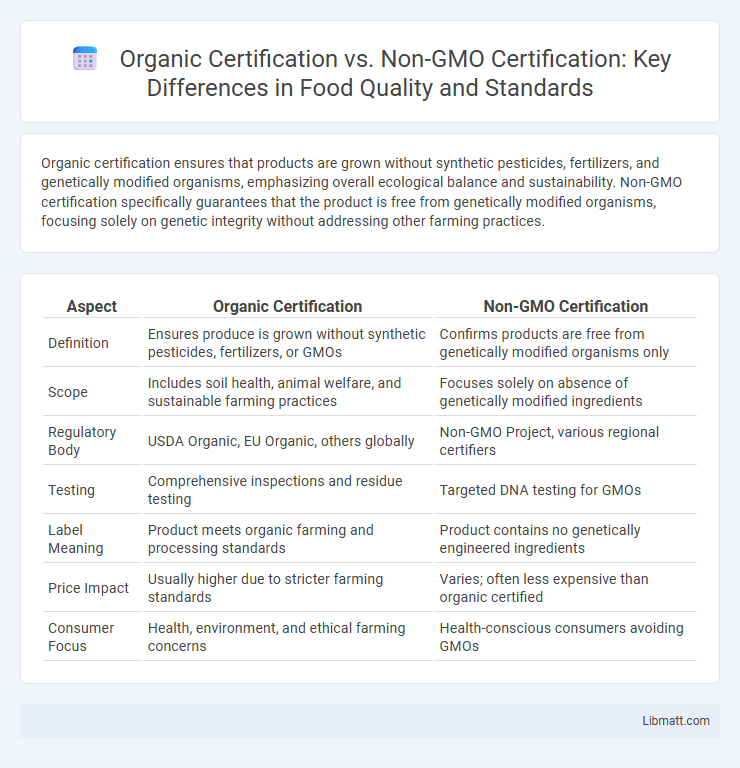Organic certification ensures that products are grown without synthetic pesticides, fertilizers, and genetically modified organisms, emphasizing overall ecological balance and sustainability. Non-GMO certification specifically guarantees that the product is free from genetically modified organisms, focusing solely on genetic integrity without addressing other farming practices.
Table of Comparison
| Aspect | Organic Certification | Non-GMO Certification |
|---|---|---|
| Definition | Ensures produce is grown without synthetic pesticides, fertilizers, or GMOs | Confirms products are free from genetically modified organisms only |
| Scope | Includes soil health, animal welfare, and sustainable farming practices | Focuses solely on absence of genetically modified ingredients |
| Regulatory Body | USDA Organic, EU Organic, others globally | Non-GMO Project, various regional certifiers |
| Testing | Comprehensive inspections and residue testing | Targeted DNA testing for GMOs |
| Label Meaning | Product meets organic farming and processing standards | Product contains no genetically engineered ingredients |
| Price Impact | Usually higher due to stricter farming standards | Varies; often less expensive than organic certified |
| Consumer Focus | Health, environment, and ethical farming concerns | Health-conscious consumers avoiding GMOs |
Understanding Organic Certification: Standards and Requirements
Organic certification mandates adherence to strict USDA National Organic Program standards, including the exclusion of synthetic pesticides, genetically modified organisms (GMOs), and chemical fertilizers. It requires detailed record-keeping, annual inspections, and verified soil and water conservation practices to maintain ecosystem balance. Non-GMO certification, while focusing solely on the absence of genetically modified ingredients, does not mandate the comprehensive environmental and health standards integral to organic certification.
What is Non-GMO Certification? Key Principles Explained
Non-GMO Certification verifies that products are made without genetically modified organisms, ensuring adherence to strict standards that prevent GMO contamination throughout the supply chain. This certification focuses on transparency, traceability, and rigorous testing to maintain product integrity for consumers seeking natural food options. Your choice of Non-GMO certified products supports agricultural practices that promote biodiversity and environmental sustainability.
Core Differences: Organic vs. Non-GMO Certification
Organic certification ensures products meet strict standards for sustainable farming, prohibiting synthetic pesticides, fertilizers, and genetically modified organisms (GMOs), while non-GMO certification solely verifies the absence of genetically modified ingredients. Organic standards encompass environmental impact, soil health, and animal welfare, whereas non-GMO certification focuses exclusively on genetic integrity without addressing farming practices. Your choice between certifications depends on whether you prioritize comprehensive ecological sustainability or simply avoiding genetically modified components in food.
Farming Practices: Organic vs. Non-GMO Methods
Organic certification mandates strict farming practices that exclude synthetic pesticides, herbicides, and fertilizers, emphasizing crop rotation, composting, and natural pest control to maintain soil health and biodiversity. Non-GMO certification specifically ensures that crops are grown from seeds not genetically modified, but it does not regulate other farming inputs or methods, allowing the use of conventional pesticides and fertilizers. These differing standards highlight that organic farming prioritizes holistic ecosystem management, whereas non-GMO certification focuses solely on the genetic origin of the seeds.
Impact on Soil Health and Biodiversity
Organic Certification promotes soil health by prohibiting synthetic fertilizers and pesticides, encouraging crop rotation, and enhancing biodiversity through habitat preservation. Non-GMO Certification focuses solely on the genetic makeup of seeds and does not directly address soil quality or ecosystem diversity. Your choice between these certifications affects the sustainability practices employed and the overall environmental impact of agricultural production.
Consumer Trust: Label Recognition and Market Perception
Organic certification is widely recognized by consumers as a comprehensive assurance of environmentally sustainable and chemical-free farming practices, boosting trust and market demand. Non-GMO certification specifically targets genetic modification concerns, appealing to a niche segment focused on food biotechnology but generally lacks the broad recognition of organic labels. Market perception favors organic certification for holistic health and environmental benefits, while non-GMO certification is often seen as a complementary but more limited attribute.
Food Safety and Nutritional Implications
Organic certification ensures food safety by prohibiting synthetic pesticides, fertilizers, and genetically modified organisms, promoting biodiversity and soil health, which can enhance nutrient density in produce. Non-GMO certification specifically guarantees that products are free from genetically modified ingredients but does not regulate pesticide use or farming practices, limiting its impact on overall food safety and nutrient profile. Studies indicate organic foods may contain higher antioxidant levels, while non-GMO certification focuses primarily on genetic integrity without direct nutritional claims.
Regulatory Bodies and Certification Processes
Organic certification is regulated by bodies like the USDA National Organic Program (NOP) in the United States, requiring adherence to strict standards including the prohibition of synthetic pesticides and fertilizers. Non-GMO certification, overseen by organizations such as the Non-GMO Project, focuses specifically on verifying that products are free from genetically modified organisms through meticulous supply chain testing and segregation protocols. The certification process for organic status involves comprehensive farm inspections and documentation, while non-GMO certification centers on ingredient traceability and rigorous lab testing to ensure GMO absence.
Economic Considerations for Farmers
Organic certification often requires farmers to implement costly practices such as crop rotation, organic pest control, and maintaining soil health, which can increase production expenses but potentially yield premium prices and access to niche markets. Non-GMO certification typically involves verifying that seeds and inputs are genetically unmodified, usually at a lower cost, allowing farmers to appeal to health-conscious consumers without the stringent requirements of organic standards. Your decision between certifications should weigh upfront costs against market demand and long-term profitability, considering consumer trends and potential price premiums in your specific agricultural sector.
Which Certification Is Right for You? Making an Informed Choice
Choosing between Organic Certification and Non-GMO Certification depends on your priorities for product quality and environmental impact. Organic Certification ensures adherence to strict farming practices that avoid synthetic pesticides, fertilizers, and genetically modified organisms, while Non-GMO Certification specifically guarantees that the product contains no genetically modified ingredients. Understanding these distinctions helps you align your purchase decisions with your values regarding health, sustainability, and transparency.
Organic Certification vs Non-GMO Certification Infographic

 libmatt.com
libmatt.com